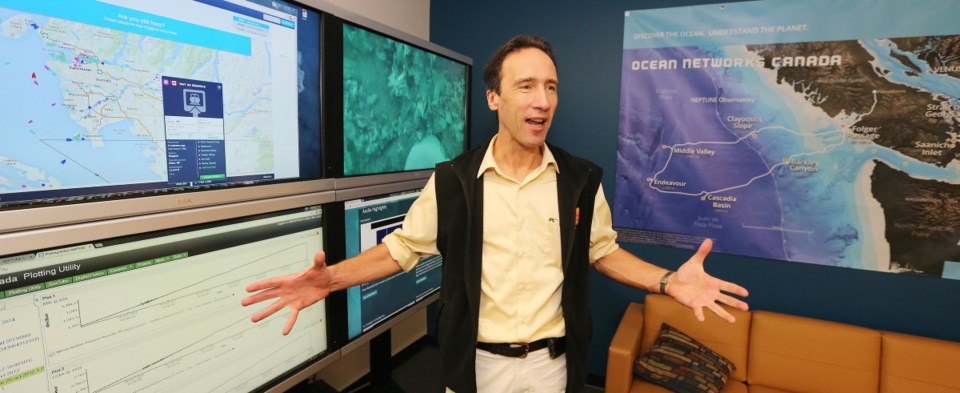Ocean researchers in Victoria are studying the magnitude-8.2 earthquake in Chile to better understand the effects of a major seismic event should it hit B.C.’s coast.
And a new program called WARN could help predict when an earthquake or tsunami is about to hit Vancouver Island, triggering a faster emergency response, said scientists from Ocean Networks Canada at the University of Victoria.
The earthquake near Iquique in northern Chile killed at least six people, forced the evacuation of thousands of people from low-lying areas closest to the epicentre, caused landslides and fires, and knocked out power.
Sea water flooded streets but there was no major tsunami damage.
Within 15 minutes of the earthquake, which happened at 8:46 p.m. Chile time, scientists from Ocean Networks Canada received an alert that the shaking had been picked up by earthquake sensors off the west coast of the Island.
About 15 hours later, a tiny ripple from the earthquake reached our shores, said Benoit Pirenne, Ocean Networks’ associate director in digital infrastructure. In that small activity lies valuable data, he said.
“Every time there’s an event like this anywhere in the world, because we keep adding new sensors in all these dangerous areas in the world, we’re learning more and more about these earthquakes, what precedes them, what follows them,” Pirenne said.
For example, that same area experienced small earthquakes over the last week. The Chilean earthquake was a subduction zone quake, where one tectonic plate shifts under another — the same conditions that exist off B.C.’s coast.
Kate Moran, director of Ocean Networks Canada, said the death toll in Tuesday’s earthquake was relatively low, likely because the Chilean government installed a more comprehensive tsunami warning system following the magnitude 8.8 quake and ensuing tsunami that hit central Chile in 2010, which killed more than 500 people, destroyed 220,000 homes and caused an estimated $30 billion in damage.
Ocean Networks Canada, which operates the NEPTUNE and VENUS ocean observatories, is beginning to develop software for WARN (Web-enabled Awareness Research Network) which would predict areas on B.C.’s coast that are susceptible to an earthquake or tsunami and warn authorities if a quake is imminent.
“We’re working with Emergency Management B.C. and Natural Resources Canada over the next several years to provide information that would alert EMBC and others that there will be major ground shaking from a major earthquake within 30 to 90 seconds,” said Moran.
That might be enough time to shut off gas panels, slow down trains, provide quick warning to schools and other emergency measures that could mitigate deaths or major damage, Moran said.
The program is funded by a $600,000 grant by Canada’s Advanced Research and Innovation Network.
B.C.’s auditor general Russ Jones said last week that the provincial government has not made it a priority to prepare for a catastrophic earthquake. Justice Minister Suzanne Anton admitted that B.C. lacks an overall earthquake plan but promised Emergency Management B.C. is working on a long-term strategy.
While no official partnership exists between the WARN program and Emergency Management B.C., a spokesperson for the Justice Ministry said the two agencies “have had preliminary discussions on the potential to integrate the science and technology developed by the WARN project into existing emergency management structures.”



